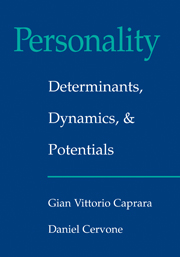Book contents
- Frontmatter
- Contents
- Preface
- PART ONE INTRODUCTION TO PERSONALITY PSYCHOLOGY
- PART TWO DESCRIPTION AND EXPLANATION
- PART THREE THE DEVELOPMENT OF PERSONALITY
- PART FOUR THE DYNAMICS OF PERSONALITY
- Introduction to Part IV
- 9 Knowledge Structures and Interpretive Processes
- 10 Affective Experience
- 11 Unconscious Processes and Conscious Experience
- 12 Motivation and Self-Regulation
- PART FIVE EPILOGUE
- References
- Author Index
- Subject Index
10 - Affective Experience
Emotions and Mood
Published online by Cambridge University Press: 04 February 2011
- Frontmatter
- Contents
- Preface
- PART ONE INTRODUCTION TO PERSONALITY PSYCHOLOGY
- PART TWO DESCRIPTION AND EXPLANATION
- PART THREE THE DEVELOPMENT OF PERSONALITY
- PART FOUR THE DYNAMICS OF PERSONALITY
- Introduction to Part IV
- 9 Knowledge Structures and Interpretive Processes
- 10 Affective Experience
- 11 Unconscious Processes and Conscious Experience
- 12 Motivation and Self-Regulation
- PART FIVE EPILOGUE
- References
- Author Index
- Subject Index
Summary
To understand individuals, we need to know not only their thoughts and actions but their feelings. Knowledge of a person's emotional experience is critical to our believing that we know who that person really is (Andersen & Ross, 1984). Emotional reactions reveal an individual's values and goals. They reflect basic biological tendencies as well as socially learned beliefs about the world and oneself. They reveal aspects of personality that people may wish to hide from others. Understanding emotions is key to understanding personality.
The study of emotional experience presents special challenges to the personality psychologist. Emotions are multifaceted phenomena that must be understood through multiple levels of analysis (e.g., Gross, 1999; Rosenberg & Fredrickson, 1998). Evolutionarily derived biological mechanisms foster universal tendencies in emotional response (Ekman & Oster, 1979; Izard, 1977; Plutchik, 1984; Tooby & Cosmides, 1990a). Inherited qualities contribute to differences in affective experience (Kagan, 1998a; Rothbart & Bates, 1998; see chapter 5). Specific brain circuits (Cacioppo, Bernston, & Crites, 1996; Davidson, 1992; Gray, 1991; LeDoux, 1996) and biochemical mechanisms (Zillman & Zillman, 1996; Zuckerman, 1995) mediate different aspects of emotional experience. Personal goals, standards, control beliefs, and views of self shape our emotional reactions (Bandura, 1997; Epstein, 1998; Higgins, 1987; Lazarus, 1991; Scherer, 1984). Cultural systems teach people how to interpret their feelings and determine the types of emotional reaction elicited by particular objects and events (Kitayama & Markus, 1994; Mesquita & Frijda, 1992; Scherer, 1997; Shweder, 1993).
- Type
- Chapter
- Information
- Personality: Determinants, Dynamics, and Potentials , pp. 284 - 310Publisher: Cambridge University PressPrint publication year: 2000



